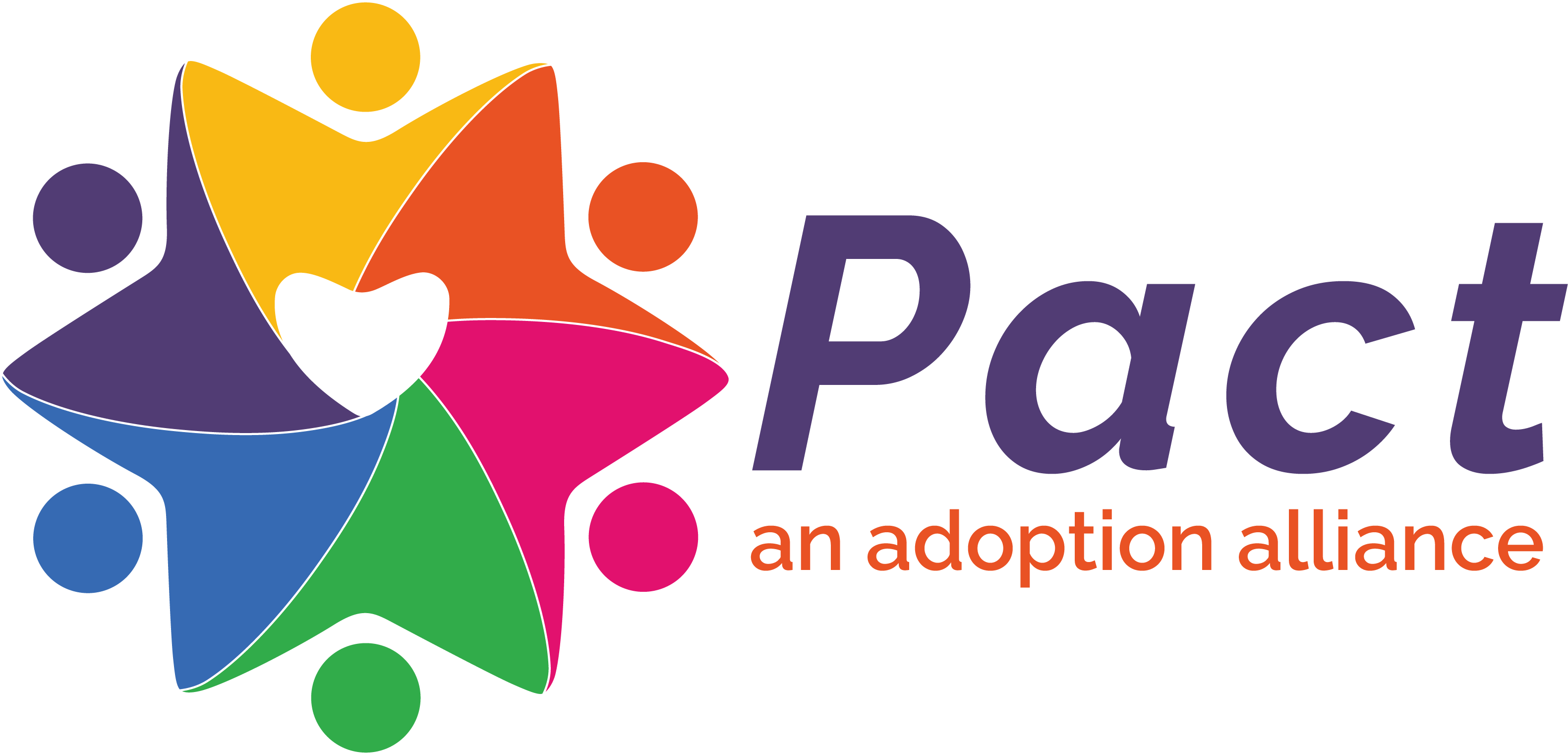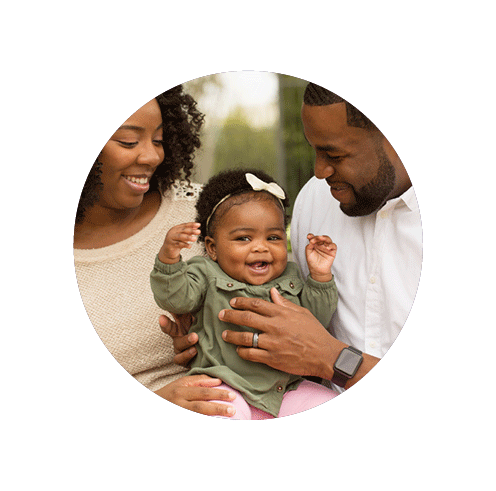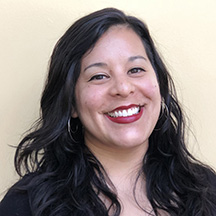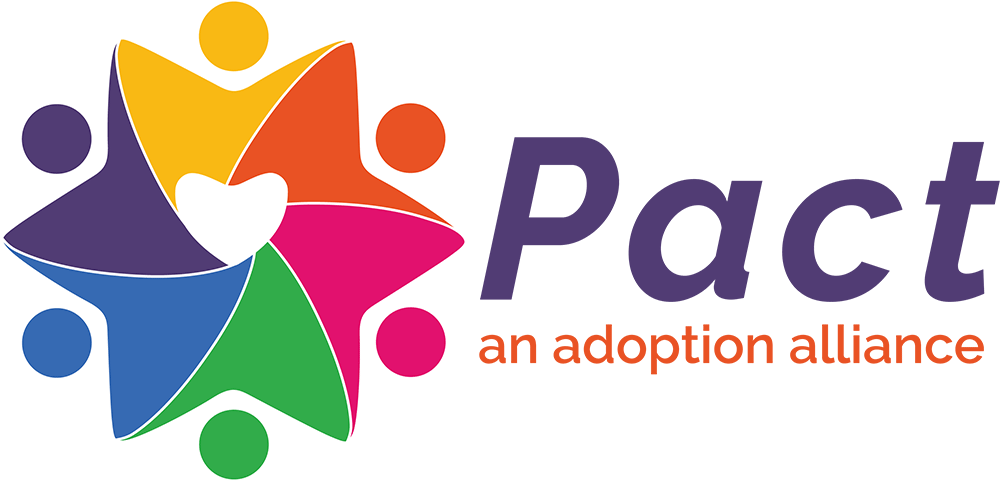
Placing a Child for Adoption

Are you pregnant?
Trying to figure out what’s best for you and your child?
“We have called more than 20 agencies, who all tell us there are no Black/Latino families for our baby. We have decided we can only work with an agency that prioritizes people of color and you are the only one we can find!”
Pact can help you work through the big decisions you are facing. We especially focus on helping pregnant people and families who are expecting Black, Latino, Asian or multiracial children.
Pact is a different kind of adoption organization.
Our approach is honest, child-focused, and anti-racist. We inform you about all your choices and connect you with resources so you can make your own decisions. Whether you choose to parent your baby, make an adoption plan, or terminate your pregnancy, Pact is here for you. You will not be pressured to choose adoption. If we can help you figure out a way to parent, on your own or with family support, we consider that a positive outcome for you and your child.
If you choose to make an adoption plan, we are here to help—we offer placement services and post-placement support.
As a licensed adoption agency, Pact works exclusively with children of color. If you pursue adoption, we can connect you with families ready to adopt who are qualified, prepared, and eager to adopt a child of color.
You can choose the best family to adopt your baby.
Most of the families working with Pact to adopt a baby include at least one parent who is Black, Latino, Asian, or multiracial. You can choose a family who reflects your child’s racial identity and heritage. Here are some families who are ready to adopt.
You will always be an important person in your child’s life—even after adoption.
We advocate for open adoption (ongoing contact between birth and adoptive families)because we believe adopted children thrive when they know their families of origin.
All of our services are FREE for expectant parents.
Using our services does not obligate you to choose adoption; we are here to help you explore your options.

Want more information?
Have questions?
Just want to talk to someone?
Text or call anytime: (510) 301-5584
Email: adoptions@pactadopt.org
Read:
Frequently Asked Questions
We are here to answer your questions
Expectant parents considering placing a child for adoption have a lot of questions. Pact is here to help. Below are basic answers to some of the most common questions we hear. Please contact us at no cost or obligation to have a more in-depth conversation.
What are adoptive parents like?
The majority, though not all, of the adoptive parents waiting to adopt through Pact are college-educated, over 35, financially stable, in good health, and have not been able to have biological children. The idea that only white adoptive parents are available is a racist myth. Pact always has qualified Black, Latino (Hispanic), Asian and multiracial families available and prepared to adopt.
Can I meet the family?
Of course! You are in charge of what happens. We want you to consider the advantages of meeting the family beforehand, but it is not required. We strongly encourage expectant parents to wait until they are in their last trimester to choose a family. We believe that choosing a family earlier than that can put unnecessary pressure on expectant parents to place a child, even if they have doubts, out of loyalty to the pre-adoptive parents.
Can I see my baby?
We hope that you will want to see your baby. You will always be an important person to your child. We believe that children do best when connections with their birth family members are maintained, but you will ultimately be in charge of your own choices.
Will my child hate me if I choose adoption?
Your child will want to understand why. They will want to know that you acted in their best interest. The most important information will be the knowledge that you worked very hard to make the right decision, that you considered their needs before your own.
What if I change my mind?
This will almost certainly be the hardest decision you will ever make. Since you will be deciding not only for yourself but for your baby and the adoptive parents, we will ask you to be as sure as you can possibly be that adoption is the right plan before you select an adoptive family. Nevertheless, you will retain the legal right to change your mind and reclaim custody without explanation until you sign the consent to the adoption after the birth of your baby (see Know Your Rights).
What if my child has already been born?
Sometimes parents think about adoption after a child is born. If you find yourself in this situation, Pact can work quickly to help make sure your baby’s needs are met while you take the time you need to learn about adoption and whether it is right for you and your baby.
“Wow. Thank you so much for the message. I think we are doing well! So happy he is healthy so far! I am just trying to be calm and take on things as they come…I think I have secured enough baby stuff for the time being. The day I called and we first talked on the phone meant everything to me as I was so stressed and alone etc. but you dropped everything to talk about my options. I just want to really say thank you from my heart, you are a true angel on earth.”
Know Your Rights
Expectant and birth parents have rights
Parents considering placing their child for adoption have rights at every stage of the process, before and after the child is born. Click below to learn more, or download our Know Your Rights PDF.
When you are expecting, and considering your options
People facing an unplanned pregnancy should be free to make the decision that is right for them, without experiencing pressure or bias. It is coercive and unethical for any adoption professional to present adoption as the “best” option. For those facing an unplanned pregnancy, all options have pros and cons. Pregnant people should be offered accurate information about all available options and empowered to make the decision that is best for them.
YOU HAVE THE RIGHT TO:
- Receive counseling to explore all your options — parenting, adoption and abortion.
- Receive a referral for an abortion.
- Explore the option of parenting your child without judgment, regardless of your age, marital status, or socioeconomic status.
- Receive referrals for economic resources such as emergency shelters, low-income housing, health insurance, food stamps, cash aid, subsidized utilities and help with childcare, if you wish to parent your baby but don’t currently have the resources to do so.
- Receive referrals for issues such as domestic violence, substance use treatment, and mental health treatment, to help you have a safe and healthy pregnancy and prepare to parent your baby if that is what you choose.
- Learn about the option to have family member(s) or people in your network become the guardian(s) or adoptive parent(s) of your child.
- Talk to multiple adoption placement providers to decide which is the best fit for you.
- Change your mind about placing your child for adoption at any time prior to the signing of legally binding documents.
When you are making decisions about adoption and contact
In adoption, “birth parent” is a term applied to women and men who are the biological parent of a child placed for adoption. Pact believes that expectant parents considering placing a child for adoption should not be pressured to think of themselves as “birth parents” before they have signed any legally binding papers, which is why we use the term “expectant parents” up until the legal paperwork is done. Paperwork signed prior to the birth of a child is not legally binding. No expectant parent can be asked to make an irreversible commitment to an adoption plan until after their baby is born.
Research has shown that adopted people, as well as birth and adoptive parents, have greater emotional health when there is ongoing contact with birth family after placement has occurred. Some states have legally binding “post-adoption contact agreements” designed to ensure that both birth and adoptive parents have legal recourse in the event there is a breakdown in ongoing communication and/or contact after an adoption placement occurs.
YOU HAVE THE RIGHT TO:
- Be referred to as a “mother” or “father,” or “expectant mother” or “expectant father”, not a “birth mother” or “birth father,” until your child’s adoption has occurred.
- Be honestly educated about the short- and long- term emotional consequences of adoption — for you and for your child.
- Be educated about open adoption and the benefits for everyone involved.
- Decline to work with adoption professionals who do not have available families that fit the criteria you have for your child’s adoptive parents, including race, ethnicity, religion, age, gender identity, marital status and willingness to maintain ongoing contact with you—to name a few.
- Interview multiple pre-adoptive families before making a commitment to either adoption or a specific family.
- Know the fees that the adoption agency, facilitator, or attorney will charge the pre-adoptive parents both in the event you do place your child for adoption and in the event you decide not to do so.
- Terminate your relationship with an adoption professional at any time, regardless of whether any papers have been signed, or any funds have been received.
- Understand which living and pregnancy expenses can be covered while you are considering adoption, and what will happen if you accept financial help but decide not to place your child.
- Request counseling from an independent therapist or mental health counselor and/or legal counsel not affiliated with the adoption professional you are working with.
- Learn which states offer legally binding contact agreements and whether you can finalize your child’s adoption in such a state.
- Understand the steps you can take if the adoptive parents ignore or attempt to change the contact agreement after placement, or if you wish to change it.
When you are at the hospital giving birth
Medical professionals and other helping professionals like social workers or counselors must respect the fact that you are legally the parent of your baby during the birthing experience and while recovering, and therefore have the same rights as any other new parents.
YOU HAVE THE RIGHT TO:
- Be treated as your baby’s mother and father, with the same rights as any other mother or father, up until you sign paperwork (usually right before leaving the hospital) authorizing the pre-adoptive family, or adoption professional, to act as guardian and/or take legal custody of your baby.
- Determine your birth and hospital plan including: who will be present before, during and after labor; who will be first to hold your baby; whether you will breastfeed; whether you want to name your baby; and how much time you want with your baby in the hospital.
- Be addressed respectfully by staff members, with the title you prefer. Some options include mother or father, first mother or first father, birth mother or birth father.
- Make decisions about the kind of medical care your baby will receive after birth, or designate someone else to have those rights.
- Take photographs and videos of your baby and with your baby.
- Receive mementos and special items from the hospital such as your baby’s wristband, a lock of their hair, a copy of their footprint, etc.
- Leave the hospital with your baby if you need more time to decide.
When you are signing documents
You will be asked to sign legal documents at several points in the process. Some of these documents are legally binding. No one can force you to sign any document.
YOU HAVE THE RIGHT TO:
- Understand the different legal rights for mothers and fathers, especially if you are in disagreement about adoption.
- Be free from pressure to sign any documents while pregnant or still recovering from childbirth, especially if you are under the influence of medications which affect your thinking, mood, judgment, or decision-making.
- Have all documents explained until you understand what they mean before signing.
- Ask for additional time to review documents. You may need to create an in-between plan for your baby’s care if you are not ready to sign.
- Decline to sign any documents which you do not agree with or understand.
- Be informed on the process of revoking your signature, especially how to do so, and how much time you have.
- Have your own legal representation, separate from the pre-adoptive family’s attorney or the attorney employed by the agency.
After your child has been placed with an adoptive family
Choosing adoption is one of the biggest decisions of your life. It’s important to know what to expect afterward, as that knowledge may affect your decisions now, prepare you for the emotions you may feel, and help you recognize when to seek professional support.
YOU HAVE THE RIGHT TO:
- Have your baby returned to you, without explanation or apology, before you have signed relinquishment papers and/or had your parental rights terminated. The timing for this depends on the state and the legal type of adoption you had started.
- Seek unbiased legal counsel if you have signed relinquishment papers and wish to have your baby returned to you. The timeframe and criteria for changing your mind can be short and in some states is non-existent, so you will need to act quickly.
- Ask your adoption placement professional for resources and referrals to help you preserve your family and parent your baby.
- Receive referrals for adoption-competent therapy with an independent counselor not affiliated with the adoption professional.
- In some states, receive help with living expenses for six to eight weeks while you are recovering from birth and getting back on your feet.
- Receive ongoing help and mediation from your agency or facilitator in navigating your open adoption with your child’s adoptive parents.
Placement Staff

Susan Dusza Guerra Leksander
Agency & Clinical Director, First/Birth Family Advocate
Susan Dusza Guerra Leksander (she/her), LMFT, is a Latina first mother, transracial domestic adoptee, and licensed psychotherapist who specializes in the adoption and foster care triads, providing treatment and consultations since 2009. When Pact became a licensed full-service adoption agency in 2017, Susan was appointed its founding Agency & Clinical Director, launching Pact’s Center for Race and Adoption Focused Therapy in 2021. She is on the ongoing complex journey of reunion with her first families and the daughter she placed for adoption.

Katie Wynen
Adoption Social Worker & LGBTQ Advocate
Katie Wynen (she/her), MSW, is a transracial, international Colombian adoptee, with a Masters in Social Work. Katie has worked with members of the adoption triad since 2006. She studied under Dr. Joyce Maguire Pavao in Boston before moving to Oakland and joining the Pact staff in 2012. Katie works in adoption placement, leads the adult adoptee support groups, and provides adoption education nationwide. Katie is an Angels in Adoption 2019 Recipient from the Congressional Coalition on Adoption Institute.

Patty C. Mundera
Bilingual Social Worker
Patty C. Mudera, (she/her), LCSW, is an adoptive parent across race and culture, an immigrant from Uruguay, and a social worker who has worked with Latinx communities for over 25 years. Patty has worked in adult behavioral health and in pediatric oncology, and has been an active participant in the Pact community since 2008.
